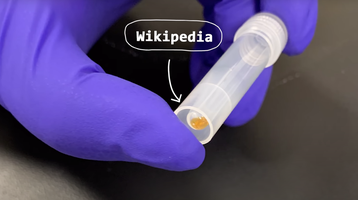DNA storage company Catalog Technologies has made the first step into DNA computation by demonstrating the ability to search data stored in DNA.
The company claimed that it made the search in a massively parallel and scalable manner with resource usage 'almost independent of the data size.'
Founded in 2016, Catalog does not store data on individual DNA molecules, instead using larger collections of molecules, which it says allows for faster writing and reading.
In September, Catalog encoded approximately 17,000 words from Shakespeare’s Hamlet into DNA in a few minutes on 'Shannon,' its writing machine.
Using that DNA archive, Catalog performed a parallel search computation and successfully retrieved all occurrences of a query word, the company claimed.
Then, in November, it encoded 200,000 words of eight Shakespeare tragedies into DNA and retrieved all occurrences of a query word in all the plays using approximately the same number of chemical computing steps, time, and resources as the initial Hamlet search.
By mid-2023, it hopes to achieve a similar feat with data sets containing over 100 million words.
“This historic and transformational achievement is based on years of work with partners and collaborators that helped make DNA-based computation a reality,” Hyunjun Park, Ph.D., founder and CEO at Catalog, said.
“With the advantages of DNA-based data storage and computation demonstrated, we now turn our attention to addressing more sophisticated applications from signal processing to machine learning over massive datasets. In parallel, we are working closely with partners and collaborators to reduce the size and complexity of our platform and to identify specific workloads to target commercial offerings.”
We profiled Catalog on the cover of the latest issue of DCD Magazine, as part of a wider feature on cutting-edge long-term storage technologies.

